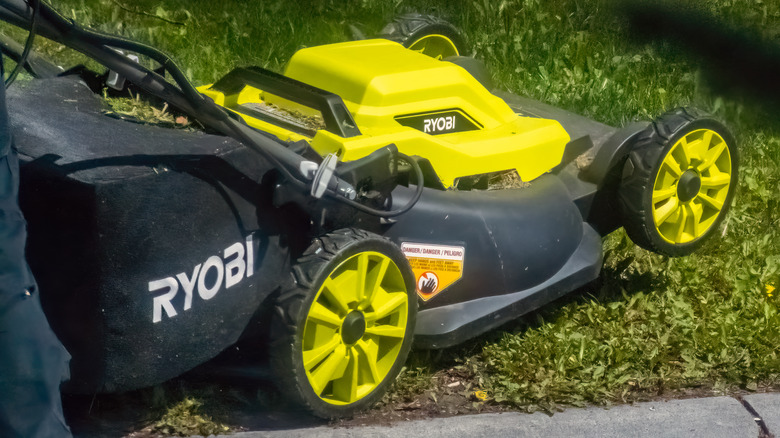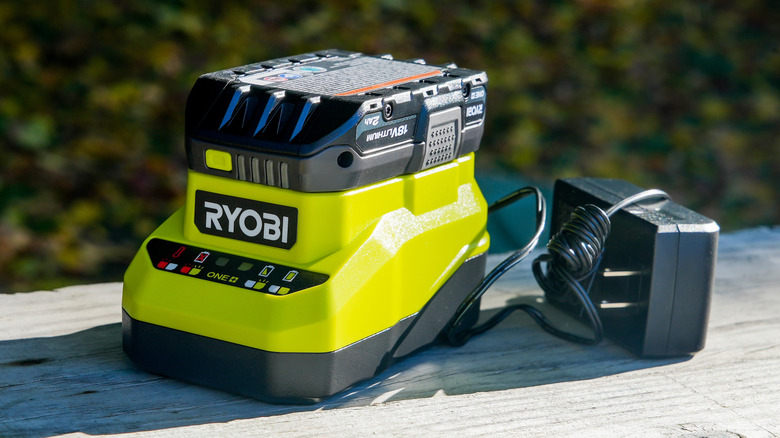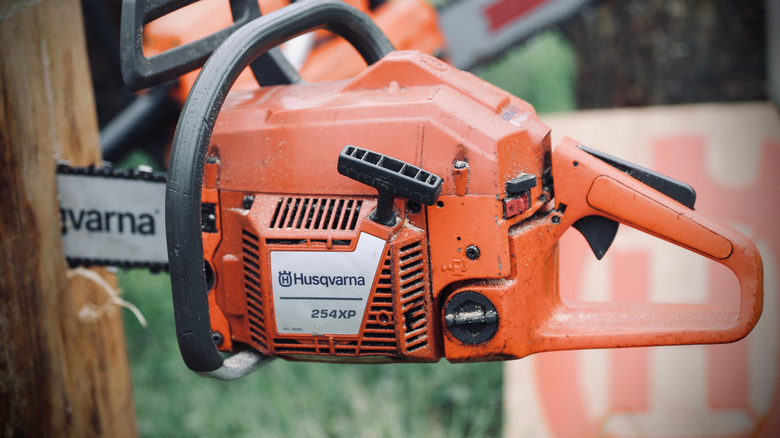You Probably Shouldn't Use Ryobi Tools For Your Commercial Landscaping - Here's Why
We may receive a commission on purchases made from links.
Ryobi hasn't become one of the most well-known names in tools for no reason. The brand has delivered a litany of different power and hand tools throughout the years, helping folks with everything from yard cleanup to small-scale construction since its founding. It remains an innovator as well, as evidenced by the new Ryobi power tools from the 40-volt line that debuted in 2025. With that said, Ryobi isn't necessarily a brand that can or should be used in all settings. It's one thing to build a Ryobi tool arsenal for around the house, but on a professional or commercial scale, the brand isn't a great choice.
There are theoretical benefits to using Ryobi professionally. They're a bit cheaper than other brands, and the selection is there to build out a strong professional collection. At the same time, the negatives are pretty glaring. They're not as durable as more professionally-minded brands, nor are they designed to withstand heavy daily use over the long haul. They are likely to break down more frequently as a result, leaving you little choice but to spend more money to replace them. Not to mention, Ryobi's warranty doesn't cover professional use, so breakage on the job isn't covered. This isn't to say that Ryobi tools are bad, but at the end of the day, the tool line just isn't made for a commercial workload.
Ryobi tools are best suited for infrequent, at-home, or personal use. This is made especially evident when looking at the stats behind the brand's tools and comparing them to more commercial options.
How Ryobi tools compare to more professional equivalents
Looking over some of the landscaping staples Ryobi has produced throughout the years, it becomes clear that the brand's tools are rather lacking for commercial purposes. For instance, the Ryobi 17-inch string trimmer operates on a 40-volt, 6Ah battery and gets up to 67 minutes of runtime on a full charge. An equivalent 40V Makita string trimmer, meanwhile, gets roughly the same amount of use time on a smaller 4Ah battery. Ryobi's blowers can struggle compared to others' too. The 18V Ryobi model weighs 5.15 pounds, reaches up to 130 mph, and needs an 18V 6Ah battery. Makita's 18V blower is only 4.6 lbs. with the 6Ah 18V LXT battery and boasts a top speed of 219 mph — though Ryobi does get superior runtime due to its lower speed.
The quality discrepancy can be seen in Ryobi's battery line as well. As for the regular battery charger, they're far from jobsite-friendly. A standard 40V Ryobi charger will take approximately four hours to bring a 5Ah, 40V battery to a full charge. Meanwhile, commercial favorite DeWalt's standard 40V charger can have a 4Ah battery charged in around 90 minutes or a 6Ah battery charged in roughly 130 minutes. If nothing else, at least Ryobi offers a rapid charger to get things moving at the workplace. Still, whether investing in a Ryobi rapid charger would be worth the added cost for slightly decreased charge times is up to the individual.
When put up against other, more professionally-trusted tool brands, Ryobi lacks in some glaring ways. Instead of it, which brands should you go with?
Tool lines more suitable for commercial landscaping use than Ryobi
Evidently, there are better lines to build a collection of rather than Ryobi. Makita and DeWalt aside, one of the most highly praised among landscapers is Stihl, which offers an assortment of gas and electric tools. Regardless of the power source, it's explained by Stihl itself that its intent is to satisfy the needs of professionals. In addition to its lineup of commercially-oriented tools, Stihl even offers suggestions, tips, and tricks for landscapers and other outdoor professionals. Unfortunately, getting ahold of Stihl products isn't always easy, since they're mostly sold through Ace Hardware stores, smaller local retailers, and select online outlets.
Alternatively, you can try another major name in the landscaping world: Husqvarna. This brand also provides a range of outdoor-use tools, though it's perhaps best known for its efforts on the lawnmower and chainsaw front. Speaking of the latter, Husqvarna's website dedicates an entire section to its professional chainsaws. It has several models for sale that are intended for heavy-duty commercial use, while delivering the most power possible with batteries and gasoline alike. While Husqvarna tools are a bit easier to find, being sold through the likes of Lowe's, they can get expensive, so be aware of this before going all-in.
Running a landscaping business is hard enough as it is, with tools intended to make getting day-to-day jobs done easier. To achieve this effect, going with a more professional-friendly brand over Ryobi is more than likely in your best interest.


